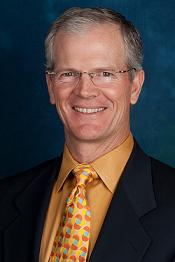 David M. Ott, MD, is a board-certified orthopedic surgeon with OrthoArizona - Arizona Orthopaedic Associates. Dr. Ott earned his medical degree from the University of California in Los Angeles. He interned and completed his residencies in general and orthopedic surgery at Maricopa Medical Center in Phoenix. He is a fellow of the American Academy of Orthopaedic Surgeons and a member of the Western Orthopaedic Association, Orthopaedic Trauma Alliance, Arizona Orthopaedic Society PAC and Arizona Orthopedic Society. Q: Why did you choose to become an orthopedic surgeon?
David M. Ott, MD, is a board-certified orthopedic surgeon with OrthoArizona - Arizona Orthopaedic Associates. Dr. Ott earned his medical degree from the University of California in Los Angeles. He interned and completed his residencies in general and orthopedic surgery at Maricopa Medical Center in Phoenix. He is a fellow of the American Academy of Orthopaedic Surgeons and a member of the Western Orthopaedic Association, Orthopaedic Trauma Alliance, Arizona Orthopaedic Society PAC and Arizona Orthopedic Society. Q: Why did you choose to become an orthopedic surgeon?Dr. David Ott: I chose to become an orthopedic surgeon due to the fact that so often orthopedic surgeons can completely resolve the problem. Treating diabetes or hypertension is indeed important, but eliminating someone's arthritic pain for life is extremely gratifying. Current orthopedic technology allows us to treat so many problems and enable patients to resume the life the way they want. All of us in orthopedics love the mechanical components of our craft; however the patient's satisfaction is truly the motivating factor.
Q: How has orthopedics changed since you began to practice?
DO: I began practice 25 years ago. Our technology has dramatically improved, but at the same time we've seen dramatic changes in the business of orthopedic medicine. Our ability to replace joints, repair fractures, perform minimally invasive arthroscopic procedures, accelerate rehabilitation and ultimately improve the patient's function has markedly evolved over the past several decades.
Our knowledge of the biology of healing and recovery has also markedly improved. With this technological explosion have come significant financial burdens. It is obvious that our technology has to be controlled and optimized. Evidence-based medicine has moved to the forefront of the science of orthopedics. Healthcare reform has made it incumbent upon orthopedists to make certain not only are they providing the best quality of care, but that they're also considering the expense side of that care.
Twenty-five years ago, cost was not a significant consideration in most of our clinical decisions; today it is paramount.
Q: What advice do you have for surgeons just entering the field of orthopedics?
DO: New surgeons into orthopedics should pursue the field with a passion and zeal. They should recognize and be honored by the fact that a stranger in their office is entrusting them with their life and well-being in an effort to become well. They should recommend to a patient what they would have done to themselves. New orthopedists should be aware that they are part of an extremely elite group of healthcare providers. They should recognize this and become leaders in the field of medicine.
Q: Are there any research developments you are currently excited about?
DO: Future developments in orthopedics will likely focus on identifying genetic predispositions for orthopedic conditions and customizing treatments earlier for these conditions. Identifying those prone to DVT and PE genetically will allow us to stratify risks and improve outcomes. Knowing those with cartilage that is more likely to degenerate will hopefully allow us to institute greater preventive measures.
Q: What changes do you see on the horizon for orthopedic surgery?
DO: The greatest immediate changes for orthopedists will be in the delivery and reimbursement methods of the future. We all agree that current payments systems are evolving dramatically and quickly. The new system will bring new opportunity but greater responsibility. Orthopedists will have to reinvent themselves, however the basic product of transforming a patient's life to one of higher function, painless activity, return to sport and the like will not change and the emotional reward will remain.
A series of articles featuring orthopedic surgeons on issues ranging from personal background to current research developments is published weekly. We invite all orthopedic surgeons and sports medicine specialists to participate.
If you are interested please email cpallardy@beckershealthcare.com.
More Articles on Sports Medicine:
Problem Solving & Moving Forward in the Field of Orthopedics: Q&A With Dr. Michael Wilmink of Arizona Orthopaedic Associates
The Engineering of Better Joint Replacement Outcomes: Q&A With Dr. Geoffrey Westrich of Hospital for Special Surgery
Technology in the World of Orthopedics: Q&A With Dr. Paul Papierski of MidAmerica Orthopedics


